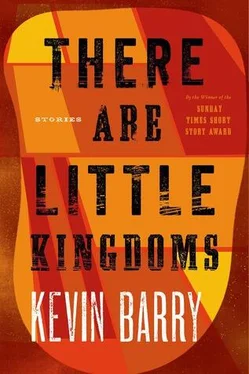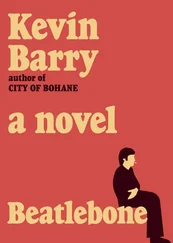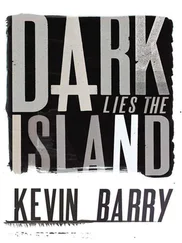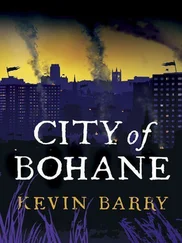‘Couldn’t be better, Pa,’ said Dee. ‘The hay is in and Cork are bate and all the beans are comin’ up in their lovely little rows.’
‘How’re things with ye really?’ he said, and there was a hint of anger, he didn’t know where it came from or why.
‘How’s herself above, Pa?’ said Donna, delighted at the spit in him. ‘Is she looking after you good?’
‘She’s holding fairly well, Pa, in all fairness like,’ said Dee. ‘That was any amount of a coat she’d on her Saturday night.’
‘Go handy now,’ he said and he looked to the ground — their lipstick and their lip gloss sealed his fate.
‘You’re treatin’ her right anyway,’ said Donna. ‘God knows don’t she deserve it.’
‘No woman deserves it more,’ said Dee.
‘Fond of it, I’d say,’ said Donna.
‘Like her mother before her,’ said Dee.
Pa Hurley tried to warn them off with a dangerous look but it was only encouragement.
‘Did ye knock out to the new bar Saturday, Pa?’
‘We did, yeah.’
‘No expense spared. Heard the Guinness there is brutal altogether?’
‘Not a great pint,’ he agreed.
‘Heard it was like disco Guinness. Would we get in, would you say?’
‘Not a chance,’ said Pa Hurley. ‘It’s a respectable establishment.’
‘Back in the knife drawer, ducky,’ said Donna.
‘Chance at all you’d give us a lift, Pa?’ asked Dee.
‘A lift where?’ he said.
He was wary. He would flirt if he had the mood or drink on him but Pa Hurley was beat if an actual plan was broached.
‘Ah sure,’ said Donna, ‘wherever. We could go watch a film or something.’
‘Ye’re lethal,’ he said. ‘There’s poor young fellas will do jail for ye.’
‘Who owns the Beetle, Pa?’
‘Forget about it!’
‘Half an hour, Pa. There won’t be a single mark on it.’
‘Never again!’ he said. ‘Look, d’ye want a few fags?’
They cleaned him out of Bensons. They peeled him with sneers. They hissed over their shoulders that he was nothing only a grease monkey but sure they’d call again anyway, all the best, Pa, keep in by the wall.
They went back among the streets. They sniffed disdainfully as they passed the gates of the Prez, from which they were serving another suspension. They stopped by the window of Daly the butcher. Daly had skinned rabbits hanging there; the display was lit by a pink sacred heart bulb. Though empty for the night, the spirit of Daly filled his shop yet: a whiskey-nosed presence, with the mad cleaver swinging. A fantasy of the village maintained by Daly was that its people were hearty, hill country eaters, as they had been in the days of his father’s butchering. He shot and skinned the rabbits himself and hung them for weeks until they were all but maggoty. Forlornly, then, they’d be brought home to feed the family of Dalys, who had rabbit coming out their ears. The cruel fact was that all Daly ever managed to sell these days was chicken nuggets. The twins were mesmerised by the skinned rabbits. The wine-coloured flesh, with maplines of blue for the hardened veins, and the taut muscles and tendons that still gave a sense of momentum, of swiftness perfected: the hung and skinned rabbits were frozen speed. This was the one moment of the day the twins were without front. There was dark wonder in them.
‘I pity the fool!’ said Donna, breaking the spell.
‘First name: Mista. Middle name: Period. Last name: T,’ said Dee.
Out the other end of the village they swung, to where the new estate was being built. The wire rails erected to secure the site had been left unchained. They squeezed through. They walked the raw crescents of the brownfield site in the thickening dark. A uniform shape was emerging. There were glassless windows and slateless roofs. Trenches were being cleared for sewage. The site was on the first steep rise of the hills and it was assaulted at all times by wind: the people who’d come to live here would be skinned themselves. There was a view south to the city: it was ever spreading, quick approaching. It was ten miles wide of sodium light, a sea of promise laid out beneath them. They drank it in and tasted faster nights to come.
They found a JCB left unlocked. They climbed up it. With the slap of a wedge heel Dee broke off the panel and the wires dangled. They’d an idea which ones to manipulate and to their great delight, the JCB growled to life.
‘Gonna open us a can o’ whupass,’ said Donna.
The JCB was steered past the eerie new houses and given some juice to batter aside the wire rails. They hummed soft love songs as they went, they smoked Bensons. They emerged to the village streets. They were not expected anywhere, not anytime soon. The accelerator was floored. They had proper road under them now.
‘Let’s see what this baby can do,’ said Dee.
The change that had come was mostly unseen. It took place behind closed doors, in front rooms and back kitchens, in bedrooms, in the heart. But if it was unseen, it was not unheard. Mr Delahunty, as he pulled the shutters and felt for the padlock, oh Delahunty could hear it well enough. It was a gear change, a low rumbling, a faint groaning beneath the skin of the earth. The ground was readying itself for new life.
The train pulled into a country station and they piled on board with country groans and country winces. There was hard wheezing and there were low whistles of dismay, as though they were half crucified from the effort of it all. They carried raw November on the breath. They carried phones, food, magazines. They eyeballed seats and shuffled towards the seats, they asked were the seats taken, for form’s sake, but they didn’t wait for an answer — it would take shotguns to keep them out of the seats. The girl tried to project belligerence or even menace but the old woman sat opposite just the same. She was bony and long and turkey-necked, ancient but with a fluency in the features, a face where age surfaces and then recedes again. She wasn’t at all shy.
Good morning, miss, she said. And I’ll beg your pardon, because the sweat is drippin’ off me. It was touch and go whether I’d make it at all. We have tar taken off that road coming up from the quare place. I’m after getting a lift off the younger one of the Canavans. The small fella, with the arm. Of course you might as well get a lift off a stone but I suppose the Canavans were always odd. He sitting there, bulling, you’d think he was after donating an organ to me. But anyway, I’m here, and I’m in the one piece, just about. What have we? Nine o’clock. Nine, and I’ve half a day put down. What did you say your name was? Lovely. And is that with an ‘h’?
A slow rumbling, then the sullen build of momentum, and the countryside was unpeeled, image by image: an old house with its slate roof caved in; magpies bossing a field; on higher ground, a twist of grey trees in the grudging light. The girl made a broad mime of adjusting her iPod, and she assumed a dead-eyed glaze, but the old woman smiled, shuffled to rearrange her bony buttocks for comfort, entwined her thin fingers and clasped them about her middle, then rotated one thumb slowly around the other.
Would you believe, she said, that I was up for half six? Sitting in the kitchen in front of a two-bar fire, with the jaws hanging open. You see I didn’t want to miss Canavan. And it’s not as if I had sleep to distract me. Sure there’s no more such thing as sleep. Do you know the way? Of course you don’t. What age did you say you were? Hah! So you were born — I’ll do the maths — you were born in 19… 88? My God. The Seoul Olympics. What was his name, with the big eyes? Ben Johnson. Only a mother could love it. Of course I lost a kidney in 1988. But yes, four o’clock in the morning, and I’m staring at the ceiling. when it’s springtime in Australia, it’s Christmas over here. Did you ever hear that one? No, well, it’s before your time I suppose. Here, above, watch — new road. This is the by-pass they’re after putting down. Look. Look! They’re going to cut out Nenagh altogether. No harm.
Читать дальше












